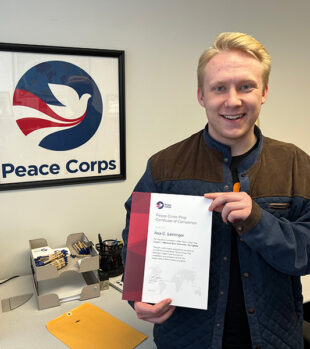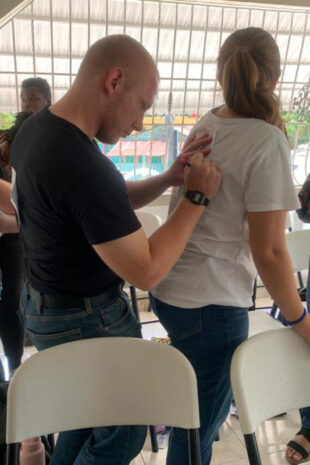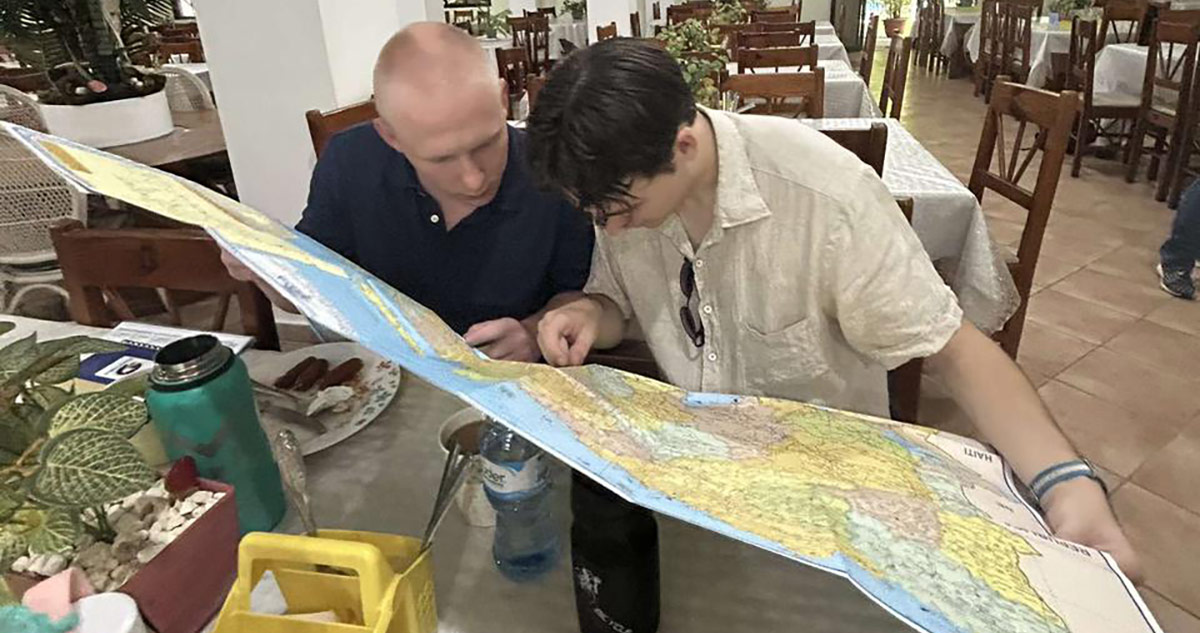The spring semester of Asa Leininger’s senior year presented him with a conundrum – he wasn’t sure what he was going to do after he graduated.
Leininger, who graduated from Missouri State University in May 2023 with bachelor of arts degrees in history and theatre, had no idea what his immediate future would look like.
“I really had no clue how I was going to apply what I had learned in my university studies within a professional setting,” Leininger said. “Likewise, I knew that I needed more stability than what professional summer-stock Shakespeare companies (theatre) had to offer.”
It was at that time that MSU’s Career Center hosted an information session with Returned Peace Corps Volunteers, sponsored by the College of Education and MSU’s Peace Corps Prep program. Leininger attended the session and was immediately “hooked.”
“What better way to spend two years than immersing myself in another culture and helping out where needed?” Leininger said. “I was going to be a Peace Corps Volunteer.”
Peace Corps Prep leads to Peace Corps Volunteer
Leininger contacted MSU’s campus Peace Corps Coordinator and head of the Department of Sociology, Anthropology and Gerontology, Dr. Mary Willis, who informed him about the Peace Corps Prep certificate. Leininger saw the certificate program as a perfect opportunity to hone his skills and demonstrate how his studies in history and theatre could be useful in the Peace Corps.

“Asa is exactly the kind of scholar that Peace Corps needs to represent the U.S.,” Willis said. “He is devoted to community engagement, especially with young people, and he exudes kindness and generosity.”
With Peace Corps Prep certificate in hand, Leininger launched what he described as a relatively “painless” Peace Corps Volunteer (PCV) application process.
Leininger also deliberately chose not to select a particular location preference.
“I was willing to go anywhere,” Leininger said. “Likewise, I figured that my chances of being invited to serve would go up if I was not picky about location.”
Leininger experienced a multitude of emotions when he learned that he had been accepted and would be stationed in the Dominican Republic.
“Ecstatic,” Leininger described his reaction. “I was incredibly honored…and incredibly relieved.”
An incredible experience
Leininger began preparing for a 27-month commitment as a PCV. He is currently spending the first three months of his tenure in training. After this, he will be officially sworn in as a PCV and will relocate to the project site, where he will live and work for the remaining two years.
“The obligations of a PCV…are to provide my services to the people of my community, to learn from the culture of the people in the Dominican Republic and to share American culture when appropriate,” Leininger explained.
“I am training to be a Youth Development Volunteer, so my goal is more specifically to encourage the positive development of the youth in whatever community in which I find myself to be,” Leininger continued. “The goal is to encourage youth to grow into healthy, civically engaged, ethically driven people.”
Leininger’s days are filled with multiple activities and responsibilities. He enjoys meals with his host family (“Some of the most wonderful people I have ever met”); gives lectures, called “charlas,” in schools; helps coordinate after-school activities such as sports, art, music, theatre and job fairs; and engages in training and Spanish language classes.
“It is an incredible experience,” Leininger said. “Learning about Dominican culture is just incredible…there is something interesting to be found within every area of culture.”
History and theatre studies at MSU excellent preparation
Even while landing in the Dominican Republic, Leininger still held lingering doubts. But not for long.
 “The thought that I was utterly unqualified started to creep into my mind and threatened to erase any traces of confidence from my being,” Leininger admitted. “But I have since realized that my degree in history has taught me how to think critically, how to analyze data, how to be curious and how to ask questions – something that is vital to cultural integration.”
“The thought that I was utterly unqualified started to creep into my mind and threatened to erase any traces of confidence from my being,” Leininger admitted. “But I have since realized that my degree in history has taught me how to think critically, how to analyze data, how to be curious and how to ask questions – something that is vital to cultural integration.”
His other major, theatre, has proved equally useful.
“My study of theatre has taught me how to identify goals, how [to] break down those goals into achievable objectives, how to carry out activities designed to realize those objectives, how to conquer obstacles, how to listen, how to improvise, how to work with people and so much more,” Leininger said.
“Asa’s majors in history and theater illustrate just how useful all disciplines and skills are to Peace Corps service, and especially to the Youth in Development sector,” Willis said.
Going for it
Leininger encouraged other MSU students to consider the Peace Corps as an option after graduation.
“Go for it!” Leininger said.
Still, the Peace Corps process is not easy, Leininger cautioned. “All the heartbreaks within everyday life are felt that much more because the Peace Corps is more than just a 9-to-5.”
The job also calls for a bit of sacrifice by giving up the comforts and culture of American life, Leininger added.
“However, if you are willing to embrace a different way of life, a different culture, and a different language, you might just find that the world is far wider – and far more beautiful – than you had ever thought possible.”
Learn more about the Peace Corps Prep program
Photos provided by Asa Leininger unless otherwise stated.

